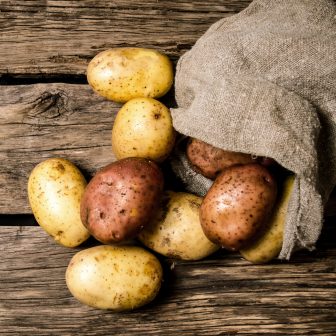By Jack Falinski
Capital News Service
When Stephanie Kipp talks with potato farmers, she hears a common concern: disease.
“Potatoes naturally have a lot of disease pressure,” said Kipp, who assists farmers through her family business, Kipp Farm Services in Edmore, Michigan. “We’re scouting potatoes weekly for growers to manage diseases, watching for insects coming in.”

Michigan potatoes. Image: Michigan Potato Industry Commission
Michigan ranks eighth in the country for potato production and contributes about $1.2 billion annually to the state’s economy, according to the Michigan Potato Industry Commission.
The U.S. Department of Agriculture estimated that Michigan harvested over 48,000 acres to produce more than 2 billion pounds of potatoes in 2021, an increase of about 3,000 acres and 300 million pounds from 2020.
To maintain a sustainable crop, Kipp said she recommends research from a partnership between the commission and Michigan State University.
The commission funds about $180,000 of research each year, said Kelly Turner, its executive director. Experts from MSU conduct most of the research, but farmers benefit from many of their findings.
“We get the research started, but then it’s also vetted by the farmers themselves,” Turner said.
The research priority last year was studying soil sustainability, she said.
She said they focused on yielding as many potatoes as possible by optimizing their water intake while reducing soil additives.
“We don’t want to put a bunch of fertilizer out there that isn’t going to get used and will leak through the soil,” Turner said. “We don’t want to spray chemicals out there during the wrong time — No. 1, they’re really expensive, and No. 2, we don’t want them floating around out in the environment.”
To enrich the soil, Chris Long, an MSU potato specialist, said he encourages rotating crops.
Long recommend farmers implement a 3-to-5-year crop rotation, cycling through different crops each year until the rotation is complete. After it’s complete, the rotation starts over.
“Every crop secretes different sugars into the soil that organisms, bacteria and fungi come and eat,” Long said. “If you feed them the same box of macaroni and cheese year after year after year after year, you only get the organisms in the soil that like macaroni and cheese.
“So, the other ones (organisms), they don’t die. They just go dormant. Once you feed them some pizza and some chicken noodle soup, then these other ones start flourishing. We want to be mindful of the ecosystem and what keeps all these organisms happy and healthy.
“If they’re cycling nutrients, then we’ll have a better potato crop,” he said.
In addition to soil sustainability, Turner said researchers continued evaluating new varieties last year. New varieties, she said, would have the potential to be more climate and pest resilient.
Seventy percent of Michigan’s potatoes are used for chips.
Although there are potato farms across the state, many come from Mecosta, Montcalm and Ionia counties, according to Long.
Turner said the research into new varieties is largely about potato chips.
She said MSU does its own variety trials in partnership with the commission, but it also leads many national chip and fry trials to compare its varieties with those from other states.
“It’s kind of like the Olympics where they take all the top athletes and have competitions,” Turner said. “They look to see who’s the fastest and who’s the best at all the different things that they would measure.
“We look at: who has the best specific gravity, who has resistance to different types of potato diseases, what is the size profile, what’s the skin set, how do they taste?
“All of that kind of stuff gets wrapped into these new varieties so they can be compared to other varieties being developed in other states across the nation,” she said.
Every five years, at least 50% of growers must vote in favor to extend the commission for it to continue to operate. This year, the Department of Agriculture and Rural Development started accepting ballots on Jan. 31 and will accept them through Feb. 11.
“To get to our socially conscious agriculture, agriculture research will continue to be vital to the potato industry,” Long said. “Research, education and promotion are going to be key parts of driving that vision, funding that vision and then sharing the results from that vision.”